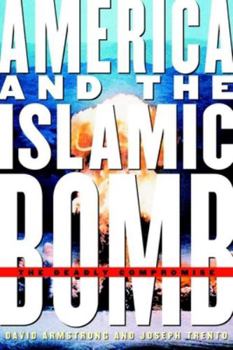America and the Islamic Bomb: The Deadly Compromise
The Carter and Reagan administrations set aside concerns about the spread of nuclear weapons in order to win Pakistan's assistance in a covert war against the Soviet Union, a policy that snowballed as the U.S. continued to turn a blind eye to Pakistani nuclear trafficking after 9/11, and has seriously compromised both U.S. and world security. Drawing on exclusive interviews, classified records, and secret government records, and secret government reports, this book provides an entirely new persepctive on the so-called A.Q. Khan nuclear black market scandal.
Format:Hardcover
Language:English
ISBN:1586421379
ISBN13:9781586421373
Release Date:October 2007
Publisher:Steerforth Press
Length:292 Pages
Weight:1.22 lbs.
Dimensions:1.0" x 6.3" x 9.2"
Customer Reviews
2 ratings
The New Balance of Terror
Published by Thriftbooks.com User , 16 years ago
This timely book is the only full account you'll find of the US role in what has become our greatest security threat, nuclear terrorism. Reading this has helped me better understand the complicated situation in the Middle East, not an easy feat. And despite the heavy subject, it's so well written that it's an enjoyable read. The authors clearly document how a series of failed US policies have led to our current situation. Every US administration since Eisenhower has placed short-term foreign policy concerns ahead of a commitment to curbing nuclear weapons. This has allowed Pakistan to first develop, and then sell, weapons of mass destruction. It began as part of a Cold War effort to counter the Soviet Union's influence. The US actually armed Islamic extremists; since these extremist groups later became the Taliban and Al Qaeda, we're partly responsible for their existence. Our world today is far more dangerous than in the Cold War. Despite President Bush's claim to have stopped the AQ Khan network, most of its members are now free. There is evidence that Pakistan's nuclear proliferation and smuggling continue, so opportunity exists for religious extremists and rogue regimes to acquire WMD. Because of misguided US strategies, we now live in a world where terrorists can acquire nuclear weapons. This, Armstrong concludes, is "the new balance of terror."
America's Role in Nuclear Proliferation
Published by Thriftbooks.com User , 17 years ago
Pakistan, where Osama bin Laden is far more popular than George Bush, possesses a nuclear arsenal built with technology from the U.S. and Europe, and financed with the help of one of America's allies (eg. Saudi Arabia; also Iran and Libya) in the Muslim world. America's supportive role began with President Carter, and has continued through President Bush. We turned a blind eye to gain Pakistan's cooperation in the Cold War and the War on Terror. Pakistan began its nuclear work in the 1970s, pursuing the use of plutonium chemically reprocessed from spent reactor fuel. The re-processor was to be courtesy of France, the reactor and technical assistance from the U.S. and Canada. This initial effort foundered on technical difficulties and international wariness. Alternatives included gaseous diffusion (used by the U.S., France, China, and Russia in their initial work - involves passing gaseous uranium through a series of thousands of membranes), and centrifugal enrichment using newly developed 70,000 rpm centrifuges within a consortium in Holland. Pakistan was under considerable pressure at the time, having just lost its foray into Kashmir and India's demonstration of a successful A-bomb. Thus, the timing was perfect for A.Q. Khan, a Pakistani working at the Holland site who had made copies of all the technical material and was anxious to lead a Pakistani nuclear effort. Pakistan welcomed him back; the timing was fortuitous for him as well - Holland had just figured that he was a spy, and was watching him closely after the CIA talked them out of arresting him. Clearly, the U.S. was aware of Khan's interests and potential even before he began working in Pakistan, and President Carter had restricting nuclear access high on his agenda. Brezezinski, however, convinced Carter to ignore Pakistan's nuclear efforts to gain their cooperation against Russia's push into Afghanistan, and ultimately through Pakistan to an Indian Ocean port. Eventually the Pakistanis also obtained considerable financial and military assistance from the U.S., as well as control over which militant Islamic sects received U.S. funding for their anti-Russian efforts in Afghanistan. (Guess who received the most funding, and got the most credit for it? The most fanatic Muslim militants, and Pakistan - despite the fact that it was U.S. money.) Pakistan's leverage over Carter was increased further by candidate Reagan's assertion that we should not get involved in others' efforts to build nuclear weapons - "It was none of our business." Thus, Pakistan's leaders knew they could likely get a better deal if Reagan was elected. (President Reagan falsely certified Pakistan as "bomb-free" several times to permit further aid - even after Pakistan was bragging that it had one, to impress India.) Sophisticated electronic inverters (very high-speed on-off switches) were required to control the centrifuges - Pakistan obtained them from the U.S. Other important components came from a world-wide ne





